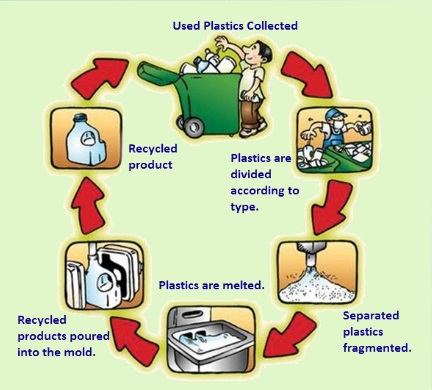WHAT İS RECYCLİNG
The transformation of useful waste produced by human beings into secondary raw materials by employing physical and chemical processes and bringing back these materials into production process is called recycling. Glass, paper, aluminium, plastic, batteries, motor oil, battery, concrete, organic waste and electronic waste are recyclable materials.

All of us must have seen, here or there, the recycling symbol over food packages and bottles of drinks. Well, why do we have this symbol? Have you ever thought of the contribution of this symbol to our daily life? As we all know, trees are cut for production of paper. Stone and sand is utilized for production of glass. We make use of natural resources in order to produce bags and packages. However, as we are all aware, our natural sources are limited.
When we can turn the materials that we consume up, back into production cycle, we can make sure that these materials can be used once more as raw materials. In this way, we can prevent the disruption of natural balance by consumption, which is ever increasing in parallel to increase in human population, by giving back to nature what we have already taken from it.
In addition to that, usage of recyclable products as raw material makes high level of energy saving possible. For example, using recycled aluminium rather than original production saves energy up to 35%. We can prevent daily increase of air pollution when we use junked products as secondary raw materials. When we use scrap paper for production of paper, we can decrease air pollution by 74-94%, water pollution by 35% and water consumption by 45%. Because of our responsibilities towards our nature, environment, and our economy and towards ourselves, today we all have to take part in recycling projects.
⇒ What are the benefits of recycling?
- It protects our natural resources.
- It saves energy.
- Waste is reduced.
- It makes great contributions to economy.
⇒ What can you do?
- Support recycling. Pay attention to buying products that have recycling symbols over their packages.
- Buy products with glass containers, being aware of the facts that glass has been recycled for thousand years and that there is no interaction (contamination) between the product and the glass container.
- Try to minimize the consumption of products such as razor blades, lighters, and pens, foil baking cups, which have single or very limited number of use.
- Try not to use plastic bags in your grocery/market shopping.
- Try to use products in large packages. You can get more of the product while consuming less packaging material.
- Re-use glass containers such as bottles and jars.
- Do not dispose of glass material together with organic waste. Accumulate them separately and leave them into bins that are special for glass waste.
- While disposing of glass jars, separate coloured jars from colourless jars. Remove metal caps.
- Make sure that you buy durable toys for your kids. Once broken, toys are easily thrashed and they are difficult to recycle.
- As presents to your loved ones, provide them with membership of environmental organisations.










